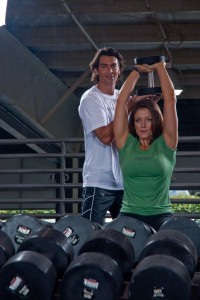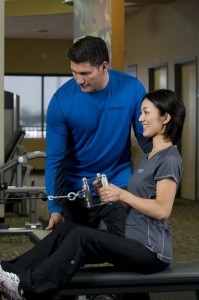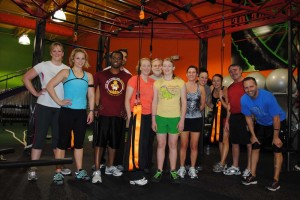 Personal training has evolved into a great profit center for clubs. Having a successful training department starts with having educated and qualified trainers, and certifications can help weed out the good from the bad. There are a vast array of certifications on the market, so it’s important to decide ahead of time what kinds of certifications will be acceptable by your club, and what your process of hiring and training will be.
Personal training has evolved into a great profit center for clubs. Having a successful training department starts with having educated and qualified trainers, and certifications can help weed out the good from the bad. There are a vast array of certifications on the market, so it’s important to decide ahead of time what kinds of certifications will be acceptable by your club, and what your process of hiring and training will be.
While there is no universal governing body over certifications, they still serve an important role. “Not just certifications, but quality certifications for trainers in your club are important because this is a field in which you are working with a client’s physical structure, metabolism and emotional well being,” said Debra Griffith, a franchise consultant for Anytime Fitness. “Because every person is different — with different needs — the training and education that comes with a quality certification, gives the trainer the knowledge to adjust their training to fit the specific needs of their client.”
Hiring Trainers
Certifications can give trainers a good knowledge base. “We look for specifically nationally recognized certifications,” Griffith said. “This way we know they are credible and have depth. The nationally recognized certifications require the trainer to continue to educate themselves to renew their certification. We also know that they have been appropriately trained and for what population they would be appropriate for. If we are unfamiliar with the certification a trainer comes to us with, we look them up online and most often find it is not acceptable. There are so many rogue certifications that promote a quick test online for $50 that we would never subject our members to.”
At Gainesville Health and Fitness Centers, all of their trainers must have one of three certifications that it finds the most valuable. “NSCA (National Strength and Conditioning Association), NASM (National Academy of Sports Medicine) and ACSM (American College of Sports Medicine) are the three main ones we have taken for a while,” said Scott Larkin, the director of personal training at GHFC. “All of our trainers have to have one of the three within 90 days of being hired. We like them to have that foundation.” He added that insurance companies want to know that trainers have some sort of base knowledge as well.
When hiring, Larkin looks for other qualities as well, but those certifications are a must. The three certifications were picked based on their reputation in the industry and their accreditation.
Certifications can be a guide when looking to hire new trainers. Looking at the trainer’s certification, clubs can quickly discover the level of education new trainers have had to go through in order to pass the final exam. “There are also specialty certifications you can look for over and above the basic personal training certification that says a trainer may be specialized in Pre/Post Natal for example,” Griffith said. “When hiring you can also look at the trainer’s area of expertise — for example, if you are an adult only gym and they specialize in youth performance training, that trainer might not be a good fit.”
Trainers at The Rush Fitness Complex are not required to have any certification to be hired. Instead, The Rush Fitness Complex searches for personality qualities and someone to mold into a good fitness coach (as personal trainers are called at The Rush), explained Rob Rettman, the vice president of education for The Rush Fitness Complex. However, trainers will receive a raise of $2.50 an hour if they complete one of the certifications that are approved by The Rush. According to Rettman, when looking at trainers to hire, those that already have certifications show that they’ve completed something and had ambition on their own to get certified. Some certifications are not cheap, and it shows an investment in a trainer’s career to already have gone through a certification process.
Members themselves don’t have an accurate perception of education for personal trainers, making it important for clubs to protect members and do the leg work for them. “I really think few members care,” said Larkin, regarding a trainer’s certification. “It makes no difference to them when they see initials after a trainer’s name. But it does let them know they have had some kind of education.”
Griffith believes that the more educated areas, where training is more prevalent and emphasized by the clubs, a client will take note of trainers’ certifications —specifically if the member is looking for sport specific or health related specialty trainers. “In clubs that promote personal training, a picture and bio of the trainer are often displayed which will educate the member to hopefully at least look to see if the trainer has the credentials they are needing to work with them, whether that be ski conditioning or diabetics,” Griffith said. “This is still an area where we need to educate the member to be more aware of how qualified to work with them their trainer really is.”
The Next Step
Once trainers are hired, their education is not complete. For trainers at The Rush Fitness, their training is just beginning. Trainers at The Rush Fitness take a multiple-choice test and have to pass with a minimum of 90 percent. “We just wanted to take certification and ‘Rushify’ it — make it work in our culture,” Rettman said. New hires go through a three-day class that is both lecture and hands-on learning and then must pass their exam. Then, they work on a proficiency checklist with a fitness manager that has different skills that must be checked off. The checklist must be completed within 30 days. It includes things like equipment orientation, measurement taking and how to lead a session.
 “Our trainers are never going to do something for the first time with a client,” Rettman said. “They will have some experience with it before.”
“Our trainers are never going to do something for the first time with a client,” Rettman said. “They will have some experience with it before.”
At GHFC, trainers participate in a 60-hour orientation that lasts two weeks. Once they graduate from orientation they will be allowed to train. Provided that they already have one of the three approved certifications. The orientation process counts as continued education for the certifications the trainers have, Larkin explained. “Once their done with the orientation process, we know they now have the base knowledge we would expect. We are all on similar pages.
Continued education is an important part of certification. GHFC puts on a couple of mini seminars that their trainers can attend. KettleBell Concepts is scheduled to do a workshop in the near future, and it will count as continued education for their trainers. Those trainers can also expect a raise as they add to their certification levels. The pay scale at GHFC is dependent on experience, certification and education. Once a year, Larkin said, they bring a big, well-known name in the industry to come and talk to their trainers about the industry and what they do.
Continued education needed by trainers depends on the individual certification. For example, trainers certified by NSCA must complete six Continuing Education Units (CEUs) — equivalent to 60 contact hours of education — over a specific three-year period to maintain certification.
Certifications
The fitness industry is ever changing and it’s important that certifications and testing processes change too. The NSCA conducts a full-scale “Job Task Analysis” every five years, allowing clubs to maintain current certification exams, said Melissa White, the certification manager for NSCA. “In addition, this process is used to validate the exam content against the actual day-to-day duties of strength and conditioning professionals and personal trainers.” Their exams are developed and maintained by Exam Development Committees that are comprised of subject matter experts who have extensive knowledge and experience in the fields of study.
In addition to written tests, certifications offer hands-on learning experiences for trainers. The National Federation of Personal Trainers (NFPT) takes steps to improve educational offerings by expanding their availability to trainers. “Hands-on education, via workshops and seminars, are more widely available than ever before, and NFPT has also expanded its testing network to over 350 locations, worldwide,” said Angie Pattengale, the director of certification for NFPT. The workshops are independent of the certification assessment. A workshop can be taken to better facilitate certification preparation, but many times workshops are taken to enhance and promote the trainer’s skill set, Pattengale explained. Workshops would depend on the certification agency. The National Exercise Trainers Association (NETA) schedules over 750 workshops every year across the U.S. — including personal trainer and group exercise certification exam prep courses. “Specialty certifications in indoor cycling, kettlebell, Pilates and yoga. NETA also offers a wide variety of continuing education courses in every discipline imaginable,” said Mario Crespo, the executive director for NETA.
 Knowing that a certification is accredited can give clubs some peace of mind. “Credibility is earned by demonstrating professional practices over time,” said Crespo. “Third party accreditation is one criteria. NCCA (National Commission for Certifying Agencies) accreditation ensures that certification agencies have taken the proper steps to make sure certification exams test for the knowledge required to do the job. Training is also important. Does the certification agency provide any training or just exams?”
Knowing that a certification is accredited can give clubs some peace of mind. “Credibility is earned by demonstrating professional practices over time,” said Crespo. “Third party accreditation is one criteria. NCCA (National Commission for Certifying Agencies) accreditation ensures that certification agencies have taken the proper steps to make sure certification exams test for the knowledge required to do the job. Training is also important. Does the certification agency provide any training or just exams?”
According to their website, NCCA uses a peer review process to: establish accreditation standards; evaluate compliance with the standards; recognize organizations/programs which demonstrate compliance; and serve as a resource on quality certification. Certification organizations that submit their programs for accreditation are evaluated based on the process and products, not the content, and are therefore applicable to all professions and industries.
Whatever your club’s hiring process, it’s vital to bring on educated trainers who have learned the ropes and have a passion for the industry. Members trust that clubs will steer them in the right direction. Deciding your policy on certifications and which ones you’ll approve is one big step toward a successful personal training department. -CS
By Ali Cicerchi









Comments 1